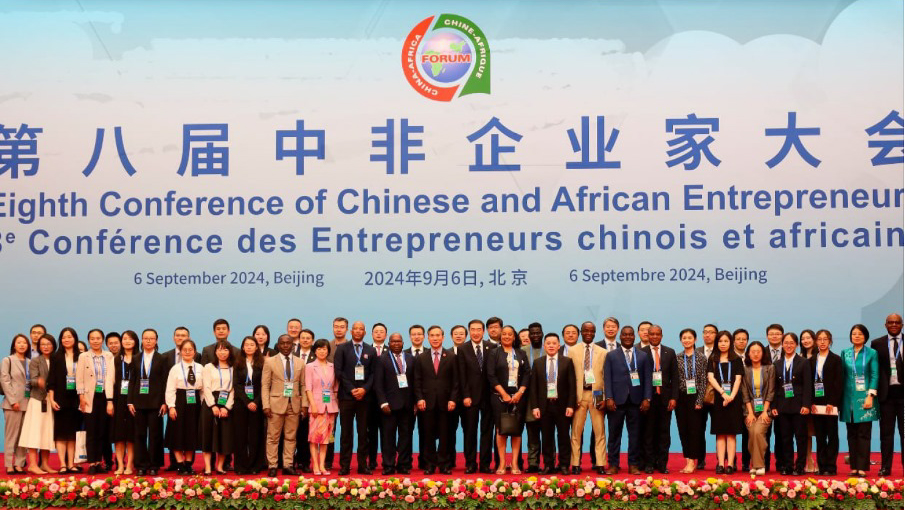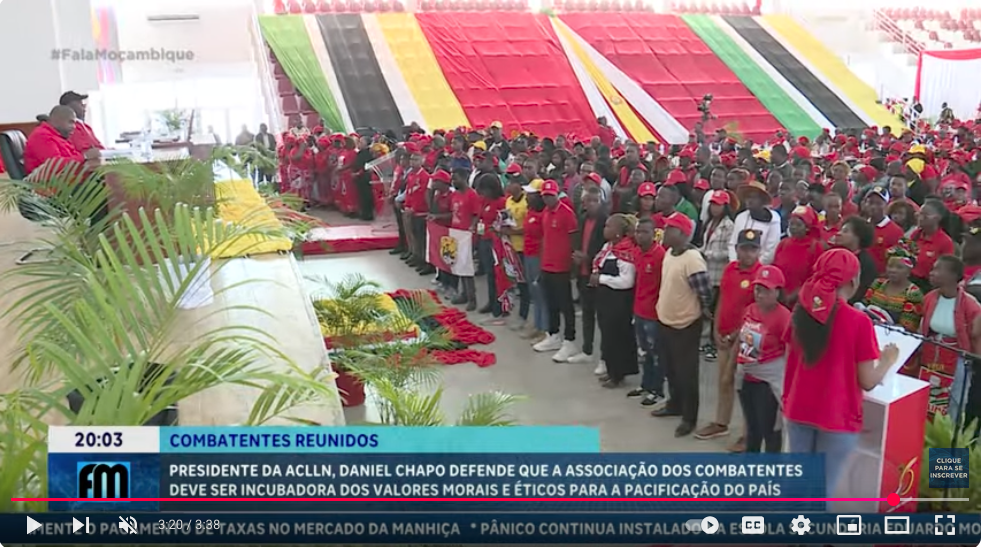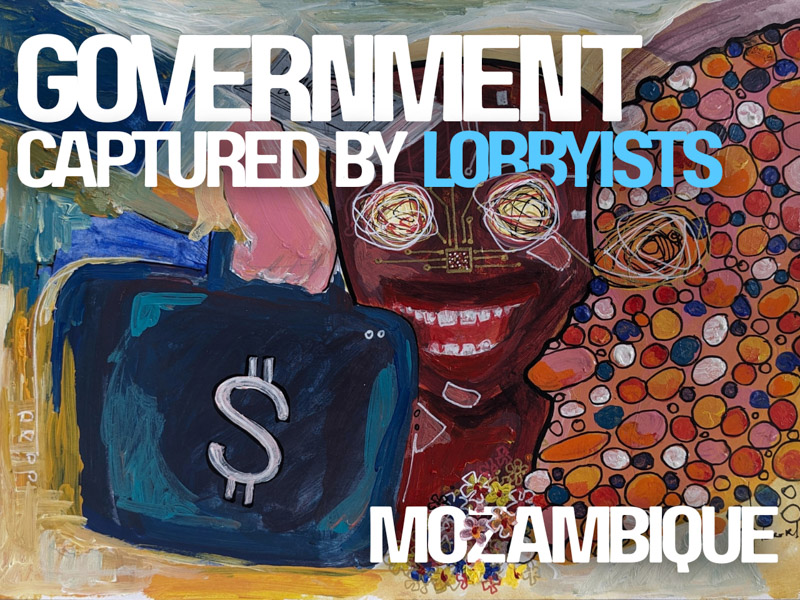Government Captured by Lobbyists
While many reports expose how multinationals have acquired natural wealth cheaply, polluted communities, and exploited workers, the role of powerful African political elites in enabling these practices has received far less attention. Mozambique’s chapter of ZAM’s new transnational investigation into Africa’s Sell-Outs portrays a bizarre network of business lobbyists operating within both the government and the ruling party.
At lunch in Maputo, my source—neatly dressed in a blue suit, tall, with a somewhat square head and a crew cut, and who calls himself a ‘lobbyist’—insists there be no recording and no mention of his name. He will only explain how one becomes a lobbyist for the many business deals struck between Mozambique’s political elite and the predominantly natural resource-extracting foreign companies operating here. Though not a businessman himself, he is a member of the CTA, the Mozambican Confederation of Business Associations.
The mission of the CTA is to contribute to the social and economic development of Mozambique, but my source speaks of other matters. “Lobbyism is a job,” he says. “You work with various organisations, both local and foreign, as a facilitator. Your base can be a business, a government institution, a bank, or an investment agency. You do the deals by engaging with the leaders of all these entities.” The people one does “deals” with, he explains, include Mozambique’s successive presidents—“because they are also involved in promoting business in order to satisfy their own interests.”
The Upper Echelon
With a “good name regarding confidentiality,” he adds, “you can then make it to the highest circles.” He moves in all these circles at occasions such as bilateral meetings, conferences, business forums, and trade fairs. “You get to know the banks, private and public companies, cooperation partners, multinationals. But most important is maintaining close relations with the government of the day. That’s where you secure support for incentives, tax and regulatory benefits, and (exploration) licenses.”
“They were signing contracts behind our backs”
My second meeting in the world of business networking in Mozambique is a man, also a member of the CTA, who participated in the Africa-China conference in Beijing in 2024. “We had a delegation of around 30 businesspeople from Mozambique. But there were others in the delegation who were not known as having businesses. We did not know them. When we left the meeting, we found out that they signed contracts. We later discovered that these people were representing directors, ministers and others.”

In contrast to the first lobbyist, my second source is a bona fide businessman who is disillusioned with the prevailing culture of backroom deals. “What is the point of running a legitimate company in sectors like gas, oil, mining, fishing, or timber processing in Mozambique,” he asks, “if others are simply signing contracts behind our backs?”
Former Combatants
It is within the upper echelons of the ruling Frelimo party, its affiliated CTA, and Frelimo’s own leadership that one encounters such “others.” Particularly favoured in this political universe is the National Committee of the Association of Veterans of the National Liberation Struggle (ACLLN), especially its top-ranking generals and their families—figures who trace their lineage to the anti-colonial struggle against Portuguese rule before Mozambique’s independence in 1975. Multiple investigations since 2013 have revealed that groups of so-called 'former combatants' hold licenses for natural resource extraction: first by Africa Confidential and later by others, including ZAM.
Among them are octogenarian General Chipande, involved in gas exploration, timber logging, and fishing; General Pachinuapa, linked to the ruby trade; the family of the late regional politician Luis Nantimbo—associated with the ACLLN and active in the gemstone sector; and the family of the late Fernando Faustino, former ACLLN general secretary and husband of Carmelite Namaswula, the former Minister of Education and current Speaker of Parliament. When Faustino died in November 2024, Mozambican media obituaries highlighted his role as a prominent mining lobbyist and license holder through his company, Companhia Moçambicana de Hidrocarbonetos, a subsidiary of the South African firm SASOL.

Examples of prominent non-military Frelimo leaders in business include former Agriculture Minister José Pacheco, former Maputo Mayor David Simango, and the family of former President Filipe Nyusi. Beyond Nyusi’s brother, Jacinto Cosme Nyusi, who holds mining interests, his son Florindo reportedly combines fishing licenses with timber trade.
The local authorities are linked to the shareholders
The extractive activities carried out by politically exposed persons, such as those mentioned above, often yield little benefit for the communities where they occur. In mineral-rich regions like Nampula and Cabo Delgado, local populations have frequently endured forced removals, environmental pollution, and unfulfilled promises of prosperity (see inter alia here).
A significant challenge arises when politically exposed persons serve as local partners of foreign extractive companies within communities, as these individuals are often closely connected to local authorities—both aligned with the same ruling party. In such contexts, even tax regulations requiring extractive companies to allocate ten percent of all royalties paid to the areas where they operate have yielded little tangible benefit locally in Cabo Delgado.
Suspicion in the Tax Room
At a tax workshop held in Pemba, Cabo Delgado, in February 2025, local participants demanded that all mining taxes and royalties from joint ventures between foreign multinationals and local partners be paid within the province and spent in consultation with local communities. They expressed support for the political platform of opposition candidate Venancio Mondlane, who had advocated this very point in the recent elections. Attendees also voiced deep mistrust of “Maputo deals,” referring to tax payments by extractive companies made in Mozambique’s capital. “Those in Maputo do not have control over the company’s operations on the ground, and not all activities are declared,” one participant explained. Another added that he suspected tax officials frequently turn a blind eye to companies that evade declarations or payments. “Some people within the tax authority end up receiving extra payments from these taxes,” he said. “There is a network facilitating such schemes.” However, Anibal Mbalango, a tax authority official and workshop organiser, rejected these suggestions, expressing strong doubts that local tax payments could be effectively managed outside of Maputo. A few months later, Mbalango was appointed as the new national director of Mozambique’s tax authority.
Post-Election Chaos
“Former President Filipe Nyusi seeks to maintain his ties to the oil and gas sector, but newly elected Daniel Chapo is equally determined to amass wealth. He hurried from Maputo to meet with mining business owners, who were eager to identify their new patron, according to a source close to Frelimo’s top leadership and ‘the generals.’ Speaking from Wimbe Beach in Pemba, Cabo Delgado, the source has recently been accompanying a delegation from Maputo visiting the province to inspect mining projects. This visit comes just months after the final election results—widely regarded as fraudulent by a populace that overwhelmingly voted for opposition candidate Venancio Mondlane in elections marred by ruling party violence and even murder—were confirmed by the Constitutional Council. Frelimo has once again secured government control.
Even with the same party once again in power, the source describes a frantic power struggle within the political elite, where new faces have emerged. The new and old guard of Frelimo are now locked in a battle to maintain, transfer, or reclaim the party’s natural resource connections. ‘It is a mess,’ the source admits. Regarding the new president Chapo’s invitation to the mining companies to meet him in Cabo Delgado, he explains that Chapo compiled a ‘guest list of companies that should be present.’ The Ministry of Mineral Resources and Energy (MIREME) was tasked with vigorously inviting representatives from these multinationals. Officials went door to door to secure their attendance and even arranged an additional flight to transport them from Maputo to Cabo Delgado, with a return trip scheduled for the same day.” (1)
The invitation, I am told, followed a meeting that Chapo held shortly after his election in February this year with ExxonMobil, the gas-extracting giant operating in Cabo Delgado. Subsequently, Dan Amman, Mozambican head of ExxonMobil, reaffirmed the company’s commitment to the gas project in the region. He added that it had been “a pleasure” to meet Chapo.
Medicines from the President
“In 2022–2023, during intense fighting with insurgents in Cabo Delgado, we faced severe shortages of medicines and equipment,” says a source within the provincial health department. “After multiple attempts, we were told nothing could be done to import the materials because (then Minister) Armindo Tiago ‘did not have the power.’ All approvals had to come through the then President of Mozambique, Filipe Jacinto Nyusi, and his allies. We had to find someone connected to that network. Once we did, we held several meetings in Pemba with that individual. Then we met a general who promised to speak to Nyusi. Two more weeks passed before the general reported he was ‘putting pressure’ on Nyusi. Of course, we understood this meant money. I don’t know what else to say.” The sources confirm they eventually received the medicines.
Change in the Air
In the first half of 2025, the Mozambican Confederation of Business Associations (CTA) was engulfed in internal strife between its president, Agostinho Vuma, and his deputy, Álvaro Massinga. Both influential figures within the ruling party Frelimo, the conflict began when Vuma accused Massinga of vote buying, triggering a fraud lawsuit. Despite this, Massinga was not expelled from the CTA and went on to win the organisation’s elections, campaigning on a platform of “change, democracy, and transparency.”
Some CTA members later reported sensing that changes might be underway within the organisation. This perception was less about Massinga himself and more a result of the growing support for the young candidate Lineu Candieiro. Even though Candieiro did not ultimately secure the leadership, his backing was widely seen as a source of hope. “Lineu is, in fact, a businessman and does not come from the Vuma or Massinga factions,” remarked one of his supporters. According to Mozambican MP Antonio Muchanga, who raised questions about the CTA’s internal conflicts in parliament, the new chair, Massinga, had been “a victim” of Vuma, who allegedly sought to remove him to “protect his own interests.” The court case against Massinga has yet to advance.
The former conservation director is “desperate”
In a similar case of a victim turned victor, Mozambique’s forestry director, Imede Falume—previously suspended over allegations of illegal timber logging and collusion with extractive timber businesses—has been reinstated. In an interview with ZAM, Falume dismissed the accusations as a “plot against him” and remarked on the “interesting” timing of Claudio Afonso’s reported dismissal. Afonso, the former director of the National Conservation Agency (ANAC), was reportedly fired without the customary reassignment to another state position. Last November, ZAM’s Into the Woods investigation exposed a network of timber traders responsible for devastating Mozambique’s national parks and revealed their connections to ANAC. Shortly thereafter, Claudio Afonso was summarily removed from his post.
Questions sent to ANAC to verify Afonso’s dismissal went unanswered. However, a source told ZAM that Afonso “has been trying to get his job back, or another position within the environment ministry. He has been calling the office of the new environment minister, Roberto Albino, but nothing is working. The man is desperate.”
Some sources expressed the view that the turmoil within the CTA and the forestry department signals a need for the ruling party to demonstrate its commitment to combating corruption. Under pressure from anti-corruption opposition candidate Venancio Mondlane, new President Daniel Chapo has made several pledges to this effect in interviews. However, his recent direct engagement with mining investors has cast renewed doubt on these assurances.
The Outrage Genie
Public outrage dating back to last year’s elections in Mozambique may have unleashed a genie that will be difficult to put back in the bottle. In May, employees of Qurimbas National Park sent an open letter to the newly elected president, Chapo, demanding an end to the rampant timber plunder in their park. Furthermore, one of the central points in Venancio Mondlane’s corruption allegations against Frelimo—the opaque renewal of the concession contract between the South African and Mozambican state road companies, scheduled for 28 February 2028—remains a contentious issue in Mozambique. This controversy largely stems from widespread public distrust of the National Roads Agency (ANE) and the seven companies it partners with, including former president Chissano’s holding company, SPI.
Other factors include the notorious lack of transparency surrounding the freeway project’s paperwork and the fact that ANE charges tolls—fueling widespread fears that this is yet another avenue for politicians to enrich themselves. A nationwide toll boycott, initiated in December 2024 by then-opposition presidential candidate Venâncio Mondlane, remained in effect until June 2025, when the government announced it would resume toll collection at a “reduced rate.”
Notes
- Moz24h, a website managed by the author of this story, Estacio Valoi, published invitation emails allegedly sent by the Ministry of Mining.
Requests for comment were sent to the office of former President Nyusi, the Military Veterans Association (ACLLN), and Frelimo. No responses were received.
See the instalments in this Transnational Investigation here
Sell Outs | The patrons who make the deals about their countries
Zambia | A corrupt political class
Zimbabwe | All the president’s minerals
The Gambia | Fighting the businessmen who erode the wetlands
DRC | Manono's Lithium Millionaires
Call to Action
ZAM believes that knowledge should be shared globally. Only by bringing multiple perspectives on a story is it possible to make accurate and informed decisions.
And that’s why we don’t have a paywall in place on our site. But we can’t do this without your valuable financial support. Donate to ZAM today and keep our platform free for all. Donate here.


